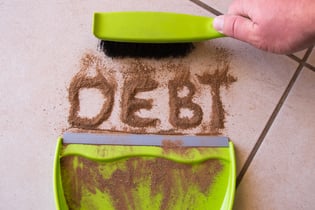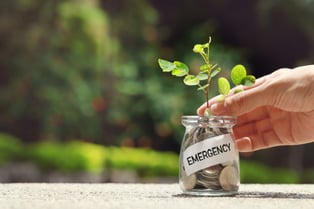Spring Clean Your Finances
 Do you ever get the winter blues? This time of year everything is covered in dust and dirt that has settled in. Spring cleaning is a great way to boost your body and mind while giving you a fresh start for Spring. This doesn’t have to be limited to your physical space - give your finances a spring clean too! Here are 7 tips to spring clean your finances.
Do you ever get the winter blues? This time of year everything is covered in dust and dirt that has settled in. Spring cleaning is a great way to boost your body and mind while giving you a fresh start for Spring. This doesn’t have to be limited to your physical space - give your finances a spring clean too! Here are 7 tips to spring clean your finances.
 Organize Your Income & Expenses
Organize Your Income & Expenses
Your budget is the foundation of your financial well-being, so cleaning it up should be a priority. Just like cleaning out your closet, budgeting can help you determine what to keep and what to get rid of. It can also help you set your financial goals such as getting out of credit card debt or buying your first home.
Become familiar with your budget and use it as a tool to determine if you’re spending within your limits or overspending on unnecessary items. If you already have a working budget, take a look at last year's expenses and see what updates you can make. If you don't have a budget, start small. Trying to spend less at the grocery store or canceling unused streaming services can go a long way.
Comb Your Credit Report
You can get a quick snap shot of all of your accounts by reviewing your free credit report and FICO score on Experian or Credit Karma. This is important to make sure everything is accurate and there are no surprises. Both of these will provide you with personalized suggestions on how to improve your score.
It is important to review the accounts to look for anything unusual, such as an account you don’t recognize. If you see something that doesn’t look right, you can dispute it with the credit bureau. If you have personal checking accounts with Osgood Bank, make sure you've taken full advantage of your ID Theft Protection. If you're not enrolled, reach out to one of our team members and we'll help you get started.
Declutter Your Debt
If you are like most people, you owe money on your credit cards, have auto and home loans, and many other miscellaneous bills that are due throughout the month. You need to get an overall big picture of what you owe. Start by listing out each of your debts, including the balance, due date, and interest rate for each.
Then, it's time to come up with a plan on the quickest and most efficient way to pay it off. Starting with a plan is the best way to make your financial goals achievable. If you have a good credit score, I would recommend consolidating your debts with a personal loan or a balance transfer credit card. Both of these options will help you pay less interest while focusing on paying off your debt.
Spruce Up Your Emergency Funds
 It is incredibly important to have funds to cover an emergency, such as an unexpected home or car repair, or a medical bill. By having money in a savings account it will help you avoid using a high interest rate credit card. Experts recommend having three to six months worth of expenses in an emergency fund.
It is incredibly important to have funds to cover an emergency, such as an unexpected home or car repair, or a medical bill. By having money in a savings account it will help you avoid using a high interest rate credit card. Experts recommend having three to six months worth of expenses in an emergency fund.
If you don’t have an emergency fund, here are some tips to get you started on building one:
-
To help stay consistent you can set up auto transfers to your savings each pay day.
-
It’s also a great idea to have your tax refund or any bonus checks deposited directly into your savings.
-
Avoid using the funds unless it is a true emergency or a planned expense.
-
Always prioritize replacing the funds as quickly as you can.
Freshen Your Retirement Funds
Raising your retirement contributions by just a small amount per pay can help increase your retirement balance without you even noticing. I recommend that you try to contribute enough to take full advantage of your employer's 401(k) match if you are offered one. If you don’t have any employer sponsored plan, an IRA is always a good option. I can help with that!
Clean Up On Credit Card Rewards
While you are evaluating your savings and spending habits, look into getting the most out of your credit cards. Charging your purchases on a rewards card can help you earn great benefits, such as earning points toward flights and hotel stays or cash back rewards. For example, if you have $100 budgeted for the grocery, use your rewards card and pay it off when you get home.
Just remember to only use your card for purchases that you can pay off each month. The rewards won’t be worth it if you use all of your gains to pay high interest rates.
Review Your Financial Goals
Do you have set financial goals? If so, now is a great time for a check in to see how far you’ve come and make changes as needed. If you haven’t, try coming up with our personal goals such as:
-
Pay off high interest debt first
-
Live within your budget
-
Increase your income
-
Save for a down payment on a house or car
-
Save for retirement
-
Break the paycheck-to-paycheck cycle
Remember to set aside time to review your progress and make adjustments as needed.
With spring on the horizon, now is the time to let your finances shine!